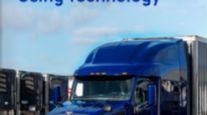Fleets’ Use of Anti-Rollover Systems Climbs as NHTSA’s Proposed Rulemaking Nears
This story appears in the May 7 print edition of Transport Topics.
With the National Highway Traffic Safety Administration moving closer to announcing a proposed rulemaking focusing on preventing truck rollovers, fleets increasingly are choosing to install anti-rollover systems on their tractors and trailers, according to industry experts.
After conducting research on available technologies and their costs and benefits, NHTSA in 2011 proposed mandating stability control systems for new tractors and buses.
“We’re expecting a notice of proposed rulemaking from NHTSA any day now . . . [and] we will probably support it,” said Ted Scott, director of engineering services at American Trucking Associations. NHTSA’s proposed rulemaking initially was expected in March.
The technology has become central to carriers’ safety programs for one simple reason: Rollovers kill truck drivers and cost millions of dollars to clean up.
“Rollovers are catastrophic events,” said Sean Saunders, Con-way Freight’s director of safety.
According to NHTSA, about two-thirds of all heavy truck driver fatalities occur in rollover crashes. And this technology is needed because by the time a driver senses a vehicle is beginning to go out of control, it’s usually too late to do anything about it, NHTSA said.
To prevent rollovers, two types of stability control systems have been developed, said Fred Andersky, director of government and industry affairs at Bendix Commercial Vehicle Systems LLC.
The first system is Roll Stability Control, or RSC, which applies the brakes in a tractor. The second is Electronic Stability Control, or ESC, which is sometimes referred to as full stability control. ESC applies brakes in both the tractor and trailer, Andersky said.
Bendix markets RSC and ESC systems under its Electronic Stability Program, or ESP. Anti-rollover technology was first developed in 2005 by Bendix, Elyria, Ohio. Bendix is a division of German pneumatic, hydraulic and electronic braking system maker Knorr-Bremse AG.
At Con-way Freight, the less-than-truckload motor carrier has installed roll-stability
control on 2,700 tractors and will likely have RSC on 4,000 tractors by next year, Saunders said. Con-way Freight’s parent, Con-way Inc., Ann Arbor, Mich., ranks No. 3 on the Transport Topics Top 100 list of the largest U.S. and Canadian for-hire carriers.
Gary Hunt, vice president for equipment and maintenance at ABF Freight System, said, “ABF conducts regular dialogue with equipment manufacturers to stay aware of and research emerging technology. As a result, we were an early adopter of tractors equipped with electronic stability control or ESC. This technology is now a baseline specification for all our new tractors.”
He added, “All ABF road tractors are equipped with Electronic Stability Control. In fact, some tractor manufacturers have made this standard equipment.”
When asked if the system helps with insurance rates, Hunt said, “Because ABF is self-insured, premiums aren’t an issue. However, safety pays dividends in the form of accident prevention, which is what ESC is all about. Just last month, researchers at the University of Michigan reported findings indicating that ESC annually reduces crashes and injuries in our industry by 4,659 and 5,909, respectively.”
ABF is a unit of Arkansas Best Corp., Fort Smith, Ark,, and ranks No. 14 on the TT for-hire list.
RCS systems apply tractor brakes once a certain lateral acceleration threshold is reached to counteract any sliding and decelerate a vehicle, Saunders said.
Electronic Stability Control combines Roll Stability Control with the added capability of yaw or rotational control, said Mark Melletat, director of trailer systems and field operations at Meritor Wabco — a joint venture between drive train and brake system supplier Meritor Inc., Troy, Mich., and brake, stability, suspension and transmission control systems provider Wabco Holdings Inc., Piscataway, N.J.
MeritorWabco markets its RSC and ESC systems under the SmartTrac brand.
Andersky said maintaining rotational control is crucial because this allows a driver to steer his tractor in the direction he wants it to go and continue to slow it down, which could defeat the motion of a trailer tip-over.
“The best way to stop a rollover is to slow down the vehicle,” he said. “The more brakes you apply, the faster you can slow down a rig.”
And this is what ESC does, Melletat said. An ESC system can reduce the risk of truck instability while in a slippery curve or when a driver is taking evasive action, he said. This allows the ESC to prevent a jackknife and drift-out conditions because its full stability control permits selective braking of tractor and trailer brakes, Melletat said. If a loss of stability is detected, tractor-trailer speed is automatically reduced by applying tractor brakes and the trailer foundation brakes, he added.
“If I were going to prioritize, I would choose electronic stability control because it will not only help prevent rollovers, it will help a driver when he’s on wet payment or in snowy conditions,” said Jim Burg, president of flatbed carrier James Burg Trucking Co., Warren, Mich.
There are about 13,000 rollovers each year, Meritor Wabco said. These types of accidents are the costliest because a typical rollover crash can easily total a tractor, trailer and the cargo. The average rollover costs from $85,000 to $250,000, the company said.
But this cost could escalate tenfold in the event of tanker truck rollover, especially if a toxic chemical or fuel is leaked, said R.J. Molder, senior vice president of fleet services at tank truck hauler Kenan Advantage Group, Canton, Ohio.
“In the tank truck industry, a rollover means a potential release of product,” Molder said. “And the environmental impact of rollovers far exceeds the cost of the loss of the equipment.”
This is one reason the tank truck industry is worried about the new entrants lured by a booming fracking industry, said John Conley, president of the National Tank Truck Carriers Association.
“In my opinion, cargo tank rollovers are a big issue,” Conley said. “Nine thousand pounds of liquid is much more dangerous than 9,000 pounds of bowling balls.”
A lot of rollovers start with a loss of control, said T.J. Thomas, Bendix’s director of marketing and customer solutions for controls.
“If a guy cuts out in front of you and slams on his brakes, you steer left and then you pull back right. But the trailer pushes the tractor and that creates a rollover. But the loss of control is what caused it,” he said.
Essentially, a loss of control can be attributed to several factors, said Kevin Tribbett, truck account manager at IMMI Inc., Westfield, Ind., a maker of gear that protects a driver’s head and neck in the event of a rollover.
Tribbett said rollovers are often tied to cornering at too-high a speed; steering too sharply to avoid objects on the road; running off the road; falling asleep at the wheel and encountering wind velocity that could topple trailers.
To trucking company executives, a rollover is a nightmare event. Now that BR Williams Trucking Inc., Oxford, Ala., has experienced a few rollovers, Greg Brown, CEO of the truckload carrier, said he’s now taking a fresh look at electronic stability control technology.
Avoiding rollovers is why safety-conscious fleets and those that operate equipment with high centers of gravity have become top users of anti-rollover technology during the past few years, said T.J. Reed, director for product marketing at Freightliner Trucks. “We have seen a steady increase in adoption of these technologies over the past three to four years,” he said. All anti-rollover technology is optional on Freightliner trucks, Reed said.
Frank Bio, product manager for trucks at Volvo Trucks North America, said the truck maker’s Volvo Enhanced Stability Technology, which is a full roll stability and anti-jackknife system, comes standard on Volvo highway chassis and is included in the base model price. Drivers like the system because it assists them in operating within a safer envelope, Bio said.
In March, Peterbilt Motors Co. said that Bendix’s ESP product with automatic traction control will be standard on a majority of its heavy-duty trucks and tractors, including the new 579 model. The announcement was made at the Mid-America Trucking Show in Louisville, Ky. A year earlier, Peterbilt said that Indiana Mills & Manufacturing’s IMMI RollTek side rollover protection was available on of its Class 8 trucks.
The potential costs of a rollover is what led Kenan to begin employing anti-rollover technology on all of its 2006 and later-year model tractors — an estimated 1,836 RCS-equipped trucks, Molder said. RCS has also been installed on about 500-600 tank truck trailers as well since 2006.
“If you ever look at a rollover, the two wheels that come off the ground first are on the trailer, not the tractor,” Molder said.
The $2,000 to $3,000 cost of anti-rollover technology for each tractor is small when viewed over the life of the unit.
“But it gives you peace of mind,” Molder said. “If you opt out of it, you will opt out at your own risk.”




